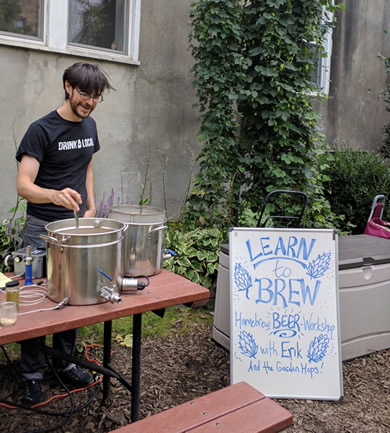The Secret Life of a Research Administrator | Homeroast and Homebrew Master
“The Secret Life of a Research Administrator” column is meant to facilitate more personal connections between SRAI members through the Catalyst newsletter. If you would like to share with the community or know of someone who will, please submit your article here.
 Some of my colleagues who have had the misfortune to see me in the morning before my first cup of coffee sometimes ask me why, if I’m so under-caffeinated and grumpy, do I not simply make a quick cup with our office-provided, single-use coffee pod machine. They quickly learned that asking this question was a mistake, as it is answered as all pre-morning beverage questions must be answered dismissively, “Life is too short for bad coffee.”
Some of my colleagues who have had the misfortune to see me in the morning before my first cup of coffee sometimes ask me why, if I’m so under-caffeinated and grumpy, do I not simply make a quick cup with our office-provided, single-use coffee pod machine. They quickly learned that asking this question was a mistake, as it is answered as all pre-morning beverage questions must be answered dismissively, “Life is too short for bad coffee.”
These same colleagues also learned that letting me pick a happy-hour bar would result in a longer than necessary walk to a place with an interesting beer menu. It is maybe a bit predictable that my answer to questions about why we weren’t already ordering at the extremely convenient bar in the ground floor of our office building was equally dismissive, “Life is too short for bad beer.”
Some of those colleagues laugh it off as me being a snob. That’s okay – I can be snobby about coffee and beer, but I will never turn down a cup or a pint out of snobbishness when one is offered. Coffee and beer have a wonderful history as social and communal beverages, and it is easy to enjoy them in the company of friends.
Other colleagues, who know me a bit better, understand that I take coffee and beer seriously. In my spare time, I roast coffee and brew beer. I live in Brooklyn – it’s pretty much required in my apartment lease. Being a homeroaster and homebrewer are fantastic hobbies. You develop an appreciation for the craft involved by those who work in the industry. Your taste and palate become more nuanced. You always have something to talk about at parties.
I love roasting coffee and brewing beer for several reasons, the first of which is that the end result is something tangible (that those tangible things are delicious beverages is a major bonus). I do not think I am alone in saying that one of the drawbacks of a career in research administration is that many of us do not see the end results of all our efforts. Sometimes it is challenging to remember that we fill important and fundamental roles in the research enterprise. Meeting the omnipresent grant deadlines, finishing the report reviews and reconciliations, developing metrics, and regulatory oversight can be satisfying, but it is a very different sense of satisfaction to sitting down with a good cup of coffee and saying, “Wow, this is really good…and I made it.” I suspect this is what Elon Musk feels like pretty much all the time.
Roasting coffee and brewing beer are great hobbies for me because they can be as complicated or simple as you want them to be. Coffee roasting for me is a much simpler process: I buy some green beans that sound like they’d be fun to try, do a few test roasts to see if I prefer a lighter or darker roast, pick one or two I like best and repeat with more beans. Beer, on the other hand, is more complicated. Planning the recipe starts with selecting which grains, yeast, and hops to use. Then come the calculations for the amount of water needed, its mineral content, and what temperature it needs to be throughout the mash (unfamiliar with the term? that’s another part of brewing – remembering all the technical lingo). Rather than going into a play-by-play of my brew day, it’s enough to say that I have made it a complicated process that sacrifices time for repeatability and accuracy. You can also buy a ready-made beer kit and use a pot on your stove – in the end, you make beer, a critical skillset post-zombie apocalypse.
Both hobbies are a blend of craft, science, and practice. You can take the time to do a deep dive into the sustainability of coffee plantations in the face of a rapidly changing climate, find ways to identify and support farmers who pay their workers more than a living wage. Learning about the craft gives you insight into what large roasting companies do to produce the lion’s share of the twelve billion pounds of roasted coffee every year so that it tastes the same from season to season. Then rejoice in being able to take a five-pound bag of beans and confidently roast it five different ways; you’ve done something in a couple hours that is impossible to do on a commercial scale.
Brewing is the same – you learn the ins and outs of the craft and your equipment, begin to explore different variables of the beer, and then you’re the one making an imperial stout with English malts, American hops, Norwegian yeast, aged on Hungarian oak that you soaked for a few months in a local bourbon. Why? Because you can. And it tastes even more delicious because you made it. Next time you brew it, maybe add some of that coffee you just roasted.

Authored by
Erik Schneebeck, JD
Director - Office of Conflict of Interest
New York University (NYU)
#Featured#Catalyst#March2020#SecretLifeofRA